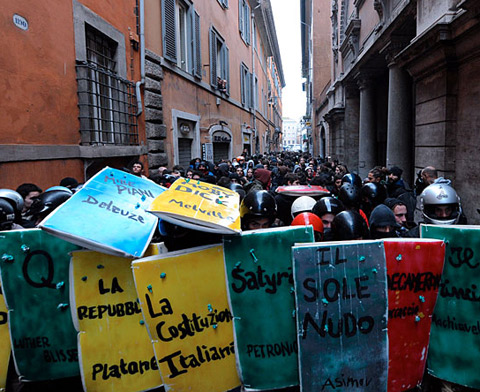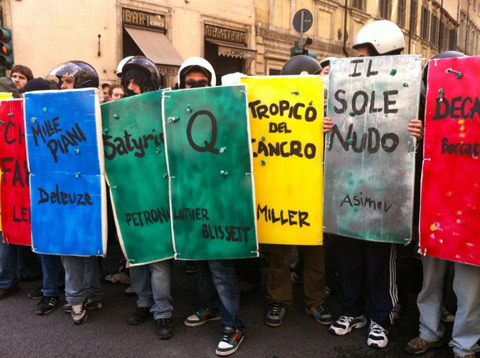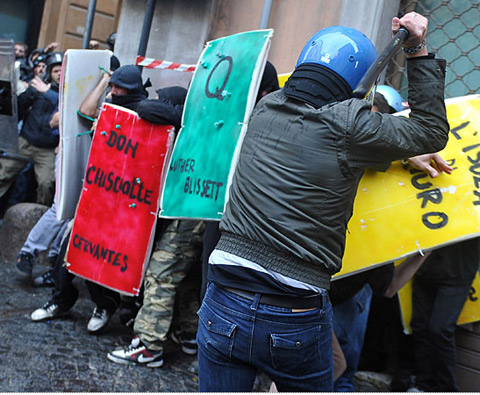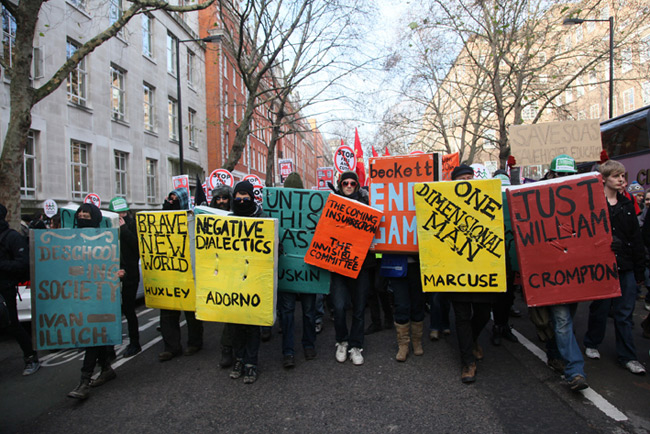Book bloc à Rome
Adrien Zammit - mercredi 15 décembre 2010 - Politique
Pour ceux qui ne suivraient pas lactualité, après les manifestations des étudiants anglais sopposant à laugmentation dégueulasse des frais dinscriptions aux facultés, cest à Rome quont éclatées hier de chaudes manifestations après la réélection (à trois voix près) du vulgaire et néfaste Silvio Berlusconi à la présidence du Conseil (grâce à l'achat de voix de députés, mais ça c'est une autre histoire me direz vous
). On peut voir ça ici ou là (merci à JBB pour les liens).
Et voilà qu'apparait en tête de cortège cet étonnant «book bloc». Lidée est excellente : se parer de boucliers pour aller en découdre avec les «gardiens de lordre» mais en y mettant la forme, en déguisant ces protections en couvertures de livres «piliers» pour la pensée du mouvement. Voilà peut-être comment on peut se battre avec ses idées.

Et voilà qu'apparait en tête de cortège cet étonnant «book bloc». Lidée est excellente : se parer de boucliers pour aller en découdre avec les «gardiens de lordre» mais en y mettant la forme, en déguisant ces protections en couvertures de livres «piliers» pour la pensée du mouvement. Voilà peut-être comment on peut se battre avec ses idées.



D'autres photos ici.
Lidée a de suite été reprise à Londres où le mouvement de protestation contre les mesures de «rigueur» continue et où on ne manque pas de marquer une franche solidarité avec le combat actuellement mené en Italie.

En anglais, voici un «résumé» de cette ligne de front proposé par lincontournable collectif italien Wu Ming :
Shall we summarize? [ ]
Our world is infected by the plague (Decameron, Giovanni Boccaccio).
The plague is the atomization of social relationships (Face aux feux du soleil, Isaac Asimov)
Those who refuse this state of things are often prey to an obsession that cripples their initiatives (Moby Dick, Herman Melville), that is to say: the obsession with Him, Silvio the Malignant Whale, this berluscocentrism affecting the public discourse.
This obsession becomes an ideological barrier and causes us to attack windmills that are put in front of us as baits (Don Quichotte, Miguel de Cervantes).
The risk is to be mesmerized by the scene of an outraged, sex-addicted, ever-carousing power (Satyricon, Pétrone).
We will avoid such risk only if we find a new story, a narrative of ourselves that will break into this world as a real scandal (Tropiques du cancer, Henry Miller), as opposed to all the fake scandals we see in the media. The emergence of a new, unified, conflict-bearing subjectivity would be the only truly intolerable scandal. For it must needs be that scandals come, says the old maxim [Matthew, 18,7].
Hence the problem of organization (Que faire?, Lénine). And, perhaps, the need to re-read Lenin, rejecting what is to be rejected, revamping what can be revamped. Of course, today the process of organization can no longer aim at building the party of the proletariat as in the 20th century: organization must take into account the enemys superior mobility, it must make us able to fight in an ever-changing situation, a scenario of constant deterritorialization (Mille Plateaux, Gilles Deleuze et Félix Guattari).
However, without a narrative, without stories to be told in the night around the campfire, any guerrilla warfare in the desert is doomed to failure. And so we return to the first book, the Decameron: it is thanks to the stories we tell one another that we can prevent the spreading of the plague [ ]
Well, Q is the only book in the Book Bloc whose authors are still living. Should they have chosen only dead writers? We might say that Q represents the here and now of the struggle, the need to act now.

